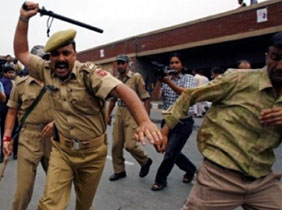INDIA: Dubey represents a decaying system — Asian Human Rights Commission
 The case of police torture reported from Allahabad, Uttar Pradesh state on 17 February must be a shame for the entire country. The video of sexual harassment and torture of a Dalit woman by Police Sub-Inspector, Mr. Kailasnath Dubey, in the presence of another woman officer in full public view was televised across the country. As usual, when the incident became public, the government reluctantly responded by temporarily suspending the officer.
The case of police torture reported from Allahabad, Uttar Pradesh state on 17 February must be a shame for the entire country. The video of sexual harassment and torture of a Dalit woman by Police Sub-Inspector, Mr. Kailasnath Dubey, in the presence of another woman officer in full public view was televised across the country. As usual, when the incident became public, the government reluctantly responded by temporarily suspending the officer.
The video, available from a newsfeed by The Times of India is available here.
Officers like Dubey are not rare in India. Cases documented by the Asian Human Rights Commission (AHRC) show a consistent and widespread pattern in the use of torture and other forms of inhuman treatment by law enforcement agencies in the country. Contrary to the general belief like those reflected in the viewers’ comments in the video mentioned above, police officers who resort to violence and inhuman treatment against persons in their custody, or members of the public are omnipresent in India.
The current state of Indian police is reflected in Dubey’s despicable act. The incident is the external manifestation of an inept and wasted institution, incapable of discharging the responsibilities of public service. Dubey is the representative of a state institution that has been neglected, overburdened and systematically denied any form of modernisation. The primitiveness of this institution is reflected in its intellect that still depends on brute force as an accepted means of crime investigation. Its colonial mindset is echoed in the acts of police officers like Dubey, who believe that it is their lawful right to punish people at will.
The government that has done nothing so far to modernise the law enforcement agencies is solely responsible for this. This neglect is intentional, and is a calculated negation of the constitutional duty by the government. When legislative processes that pleases the administration’s whims like the Biotechnology Regulatory Authority of India Bill, 2008 gets a ‘fast lane’ approach, an equally or probably more important piece of legislation, the Prevention of Torture Bill, 2008 is subjected to the legislative deepfreeze since the day it was drafted.
Government’s lack of interest in the issue is reflected in the Bill. The Bill, a mere 477 words in a page and half, not only fails to meet international standards against torture, but also falls short of the country’s own domestic jurisprudence on the issue developed by its courts, in particular the Supreme Court of India. The Bill, like Dubey, represents yet another institution in the country, its legislature, and its collective intellectual dishonesty.
Temporarily suspending Dubey from service is a standard practice adopted by the government to avoid responsibility. Dubey is a Sub-Inspector of Police, having officers under his command and above him. The question is, what other procedures will follow the suspension.
Will there be an independent investigation in the case? Is there any mechanism other than the facade of a departmental inquiry to investigate crimes of this nature? Are Dubey’s acts a crime? If it is a crime, how is it different from a crime of similar nature committed by an ordinary citizen? Are Dubey’s superior officers responsible for Dubey’s conduct? And above all, how would the government compensate the victim in the case and based on what standards?
Torture is viewed as a heinous crime. It is condemned internationally and its use considered a denominator with which the justice institutions are assessed. Good law enforcement agencies being a necessary requisite for development, in developed nations, torture is rare as opposed to countries like India.
Sustainable and equitable growth is impossible to achieve without healthy justice institutions.
India has thus far failed to accept the reality that its policing requires an overhauling. The country has conveniently excused its self from ratifying the UN International Convention against Torture and Other Cruel, Inhuman or Degrading Treatment or Punishment on the ground that its domestic legal framework is capable of dealing with the issue without obliging to an international framework.
India has repeatedly refused to accept the request of the Rapporteur on Torture to visit the country. In fact it has refused entry to several other mandate holders within the UN framework, a negative denominator with which India’s human rights framework is assessed.
Torture negates the concept of democracy. It promotes corruption and mostly affects the poor. Torture has no place in a rule of law framework and vitiates the moral as well as legal authority of a government.
A government that lets its law enforcement agencies to torture the citizens rules by fear not by the law. Such a government is equally responsible for the crime like the torturer police officer.



